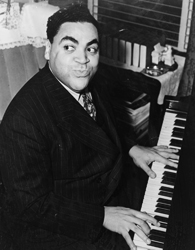Fats Waller’s piano virtuousity and outsize personality made him a jazz legend. But his talents didn’t stop there; he was also a vaudeville performer, bandleader and consummate composer. His exuberant style, combined with his flawless technique, gave the Jazz Era some of its most memorable music.
Fats Waller’s Early Days
Thomas Wright Waller was born in New York City on May 21, 1904, to Edward and Adeline Waller. His father was a Baptist preacher who held services in Harlem, and his mother played piano. With a family history of musical talent, and the opportunity to play the organ during his father’s services, Thomas acquired an early grounding in classical music.
At the age of 15, Fats, as he came to be known, got a job at Harlem’s Lincoln Theater as an organist. He later had the opportunity to study with two legendary “stride” pianists, James P. Johnson and Willie “The Lion” Smith. In stride technique, the left hand moves back and forth between two intervals that differ widely in pitch, while the right hand engages in ornamental flourishes.
Sources in this Story
- Biography.com: Fats Waller
- Rutgers University Libraries: Institute of Jazz Studies: Fats Waller Forever
- Red Hot Jazz Archive: Fats Waller and his Rhythm
- The New York Times: Plaque in Harlem a Memorial to Fats Waller
Waller’s Notable Accomplishments
By the early 1920s, Fats Waller was recording on the vaudeville circuit and soon had other musicians clamoring to record his compositions. His stage shows were a huge success; the “Hot Chocolates” revue, which he composed, provided opportunities for both Cab Calloway and Louis Armstrong to shine.
On April 27, 1928, he debuted at Carnegie Hall as the piano soloist for a version of his former teacher James P. Johnson’s fantasy “Yamekraw” for piano and orchestra.
Waller’s radio show, “Fats Waller’s Rhythm Club,” allowed him to employ his many talents, from singing to satirizing. His endless patter included amusing quips still in use today, such as, “One never knows, do one?” This success also led to the formation of the band Fats Waller and His Rhythm.
He was also very popular in Europe and spent time touring there, as well as in the United States. Shortly before his death, he had a memorable screen appearance in the film “Stormy Weather” with Lena Horne. His performance of “Ain’t Misbehavin’” is particularly notable.
Waller’s comedic persona on stage sometimes masked his mastery of the piano, but other musicians recognized his exemplary skill and genius. Murray Horwitz of the American Film Institute says, “He is, after all, the point where those two art forms meet: he is the greatest jazz pianist who ever tried to make people laugh, and the greatest comedian who ever played jazz.”
The Man and His Work
- “If You Got to Ask, You Ain’t Got It!” (CD)
- “Ain’t Misbehaving: The Story of Fats Waller,” by Ed Kirkeby
The Rest of the Story
A hard livin’, hard drinkin’ man, Fats Waller succumbed to pneumonia on December 15, 1943, during a train trip back to New York after appearances on the West Coast. It is believed that stress from prison time for nonpayment of alimony, as well as a body weight of almost 300 pounds, contributed to his early death at the age of 39.
Long after his death, Waller’s influence remains palpable. The Grammy Hall of Fame established a special award in 1973 to honor recordings that have a special historical significance; “Ain’t Misbehavin’” was inducted in 1984 and “Honeysuckle Rose” in 1999.
A plaque at the site where Waller spent his childhood in Harlem was erected in 1981.











